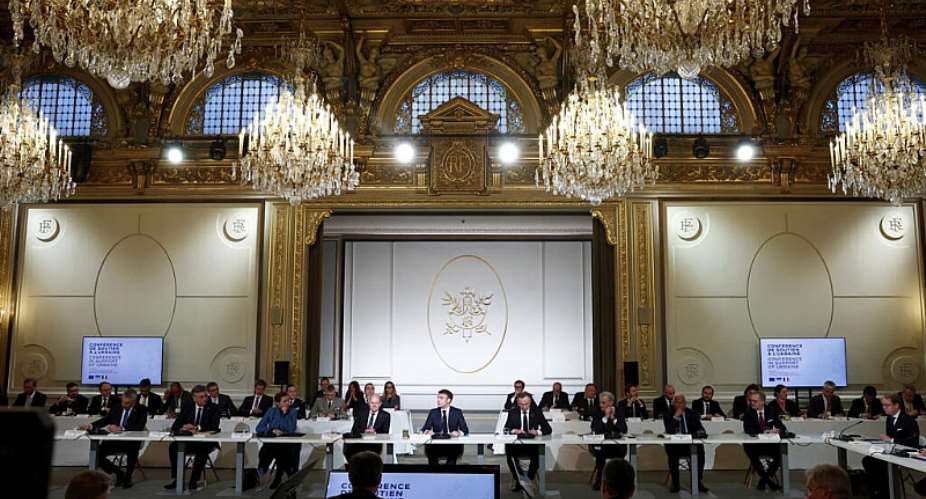French President Emmanuel Macron faced uneasy reactions from European allies and a warning from the Kremlin on Tuesday after he refused to rule out the dispatch of Western ground troops to Ukraine in its fight against the Russian invasion.
Macron said after a conference of European leaders on Monday that "everything that is necessary" must be done to ensure the defeat of Russia, including deploying troops.
The Kremlin warned of the "inevitability" of confrontation between NATO and Russia if troops from the alliance were deployed in the conflict, which would break a major taboo the West has so far been reluctant to challenge.
Macron hosted the conference just over two years to the day after Russia invaded Ukraine seeking to rally greater support for Kyiv, which faces increasing battlefield challenges and dwindling munition stocks.
He painted a grim picture of Russia under President Vladimir Putin, arguing there had been a "change of posture" even in recent months that had seen a hardening of its stance both domestically and in Ukraine.
While there was "no consensus" on the sending of Western ground troops to Ukraine, "nothing should be ruled out. We will do whatever it takes to ensure that Russia cannot win this war," Macron added.
'Not at war with Russia'
Macron had refused to say more about France's position, citing the need for "strategic ambiguity" but saying the issue was mentioned "among the options".
"We are convinced that the defeat of Russia is indispensable to security and stability in Europe," Macron said.
Slovak Prime Minister Robert Fico, accused by critics of being too cosy with Moscow, said after the meeting that there was disunity on the issue among European leaders.
"There are countries that are ready to send their own soldiers to Ukraine, there are countries that say never - Slovakia is among them - and there are countries that say that this proposal should be considered," he said.
Prime Minister Ulf Kristersson of Sweden, which is set to join NATO, poured cold water on the idea, saying "it's not on the cards at all for the moment".
German Chancellor Olaf Scholz, meanwhile, said in a tetchy message on X: "We agreed that everyone must do more for Ukraine in Paris yesterday. Ukraine needs weapons, ammunition and air defence. We are working on it. It is clear: there will be no ground troops from European countries or NATO."
Kremlin spokesman Dmitry Peskov said that, if NATO troops appeared in Ukraine, "we (would) need to speak not about a possibility but of the inevitability" of confrontation.
"This is absolutely not in the interests of these countries, they should be aware of this," he added.
A NATO official, who spoke on condition of anonymity, emphasised "there are no plans for NATO combat troops on the ground in Ukraine" despite the "unprecedented military support" from the alliance.
The Italian government said support for Ukraine did not include sending troops.
"When we talk about sending troops, we must be very cautious because we must not make people think we are at war with Russia," said Italian Foreign Minister Antonio Tajani.
"We are not at war with Russia," he said.
But the United Kingdom issued a somewhat more circumspect reaction, with Prime Minister Rishi Sunak's spokesman saying there were no plans for a "large-scale" troop deployment to Ukraine.
(with AFP)





 Recently dismissed Weija-Gbawe MCE dead
Recently dismissed Weija-Gbawe MCE dead
 A/R: We’ll engage people to catch stray cattle to protect trees – Simon Osei-Men...
A/R: We’ll engage people to catch stray cattle to protect trees – Simon Osei-Men...
 Kumasi traders threaten to campaign against NPP over abandoned markets
Kumasi traders threaten to campaign against NPP over abandoned markets
 Bawumia to tour Bono and Ahafo regions
Bawumia to tour Bono and Ahafo regions
 Fire destroy structures at Saban Park in Chorkor
Fire destroy structures at Saban Park in Chorkor
 Military-ruled Chad votes for president in bloody transition
Military-ruled Chad votes for president in bloody transition
 Election 2024: NPP done so much and deserves victory — Akufo-Addo
Election 2024: NPP done so much and deserves victory — Akufo-Addo
 AG has 'killed' Cecilia Dapaah matter; 'abrupt end' fits clearing-agent pattern—...
AG has 'killed' Cecilia Dapaah matter; 'abrupt end' fits clearing-agent pattern—...
 Former Weija-Gbawe MCE Patrick Kumor dies
Former Weija-Gbawe MCE Patrick Kumor dies
 French banks exit from Africa will create opportunities for local banks — Fitch ...
French banks exit from Africa will create opportunities for local banks — Fitch ...
